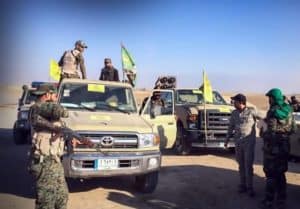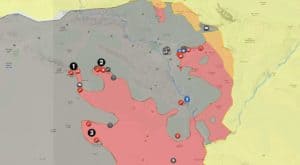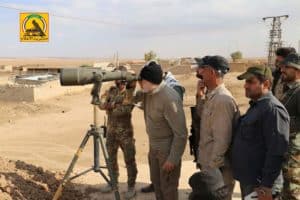
IRGC-backed Harakat al Nujaba forces preparing to move out in western Mosul Axis.
Two weeks after the operation to liberate Mosul began, Iraqi security forces have reached the eastern outskirts of the city in Ninevah province with the help of US-led coalition airpower, as reported by journalists embedded with Iraqi forces. Meanwhile, Iraqi militias operating as part of the Popular Mobilization Forces (PMF) are advancing toward Tal Afar, 33 miles west of Mosul, from south of the city. The PMF’s objective is to prevent the Islamic State’s escape to Syria.
The PMF claimed today that it severed the Islamic State’s route to its stronghold in Raqqa, according to the group’s official Twitter account.
Hadi al Ameri, a PMF commander and head of the Iranian-backed Badr Organization, claimed to have captured the Mahalabia area (point 1 on map, below), which connects Tal Afar and Mosul. Ameri told Al Sumaria yesterday that this has been a primary access route for the Islamic State in Mosul, using it to enter the city in 2014 for operations in the area. Nevertheless, the group still controls the main highway to Tal Afar and the territory into Syria.

PMF advances in western Mosul axis, Nov. 3. Credit: Lumisis.
Ameri declared that that his forces will continue advancing north to capture the main highway between Mosul and Tal Afar, and then the town itself. PMF forces sources have also advanced into Maseed (2) and Ayn al Jahesh (3), clearing surrounding villages. The PMF announcements have been carried in state-affiliated Iranian media.
As soon as the PMF launched its operation for Tal Afar this past week, its spokesman declared the group’s readiness to shift operations into Syria following the liberation of Mosul. A commander told the media on Nov. 2 that “chasing” the Islamic State into Syria was the PMF’s “right.” The shift to Syria after Mosul has been planned for several months in coordination with Tehran. During a trip to Iran in September, Iranian-backed Harakat al Nujaba head Akram al-Kaabi spoke about the necessity of opening a front into the Islamic State’s territory into eastern Syria to defend Iraq’s “national security” from further Islamic State incursions. About 5,000 Iraqi militiamen, most of whom belong to Harakat al Nujaba, are already in Aleppo fighting as part of an expeditionary force led by Iran’s Islamic Revolutionary Guard Corps (IRGC) in Syria, according to militia leaders who spoke with The Wall Street Journal.
IRGC-backed Iraqi militias have been involved in Syria since 2012 primarily to preserve the government of Bashar al Assad. They were an effective fighting force there until most were recalled home in mid-2014 following the Islamic State’s incursion in Iraq. Driving that group from Mosul allowed them to once again redeploy to Syria. The PMF could use such lines of argument to push back against calls for dissolution, portray itself as a necessary security force post-Mosul, and argue that the original 2014 mandate to drive the Islamic State from Iraq is unfinished and needs guarantees to prevent the incursion of the Islamic State and successive groups.
The PMF is an umbrella organization of Shiite, Sunnis, Christian, and Yazidi militias formed following the fatwa of Grand Ayatollah Ali Sistani in 2014 to drive the Islamic State from Iraq, is controlled and dominated by IRGC-backed proxies. In an effort to rein in these militias, Prime Minister Abadi has created a parallel military organization for the PMF as a security apparatus outside of the command structure. However, the PMF remains riddled with Iranian-supported militias, and its key leaders are beholden to IRGC-Qods Force’s commander, Qassem Soleimani.
Approximately 15,000 Shiite militia fighters are participating in the battle for Mosul, according to the Hezbollah Brigade, though they have agreed to stay on its outskirts to avoid stoking sectarian tensions in the majority Sunni city, a spokesman told Al Jazeera. The IRGC-backed units include the Badr Organization, Asaib Ahl al-Haq (AAH), Hezbollah Brigades, Harakat al Nujaba, Imam Ali Brigades, Saraya Ashura, and Saraya Khorasani. Their presence has been reflected in photographs and announcements by the militias themselves. Senior PMF commander and Saraya Khorasani deputy Hamed Jazayeri told Iran’s IRGC-affiliated Tasnim that the Iraqi air force has launched strikes in areas ahead of the PMF’s advance.
Three thousand Shiite Turkmen militiamen, who had lived in Tal Afar prior to its takeover by the Islamic State and have since been armed and trained by the PMF, will also participate in the fight to retake Tal Afar, according to an AAH spokesman. There are concerns, however, about the intentions of the returning Shiite Turkmen, who may want to exact retribution on Sunni Turkmen who they claim sympathize with the Islamic State, according to a senior Amnesty International official. Analysts have warned about the possibility of sectarian violence in Tal Afar.
Meanwhile, Turkey has been mobilizing tanks and artillery near the Turkish town of Silopi near the Iraqi border since Nov. 1, warning against PMF participation in Tal Afar and threatened to intervene if the PMF abused civilians. In response, Prime Minister Abadi cautioned Turkey that Iraqi forces do not want war with Turkey but would be “ready” if it happens. PMF commanders have also issued incendiary warnings against Turkish forces near Mosul for the past month. Turkey’s posturing and statements have complicated the Mosul operation, increasing the risk that the situation can escalate into war.
Turkish President Recep Erdogan clearly wants to expand his influence his Iraq, as he has accelerated efforts to consolidate his control at home since the this summer’s failed coup d’etat. He has escalated the purging of his political opponents at home this past week, arresting pro-Kurdish party leaders and parliamentarians and shutting down social media access on Nov. 3, as reported in The Guardian.

Abu Mahdi al Muhandis, PMF operations commander and deputy to Qassem Soleimani, inspecting positions, Nov. 1. Credit: Official PMF social media account








2 Comments
With Ankara revealing its investment in Daesh, the situation becomes more clear. It will be a dangerous step for Turkish armed forces to enter the Mosul Tal Afar area inside Iraq, even under the pretense of protecting civilians.
Ankara had hoped — or so it appears — to back the Daesh forces in the establishment of a supposedly independent Caliphate, which could rival the Caliphate that Saudi Arabia has become.
Daesh sectarian violence has gotten other radicals in other nations to unhitch themselves from the Saudi funded al Qaeda Riyadh had spent years developing the mosques with radical Imams recruiting former animists to join in their actions in Africa, Asia, South America and even western Europe.
With te United States profoundly confused and failing to deliver enough force to end the matter quickly, the relief of Mosul and Tal Afar will become unnecessarily bloody.
Who is going to fix Erdogan? I mean before we fight an all-in WW3 in the Middle East?